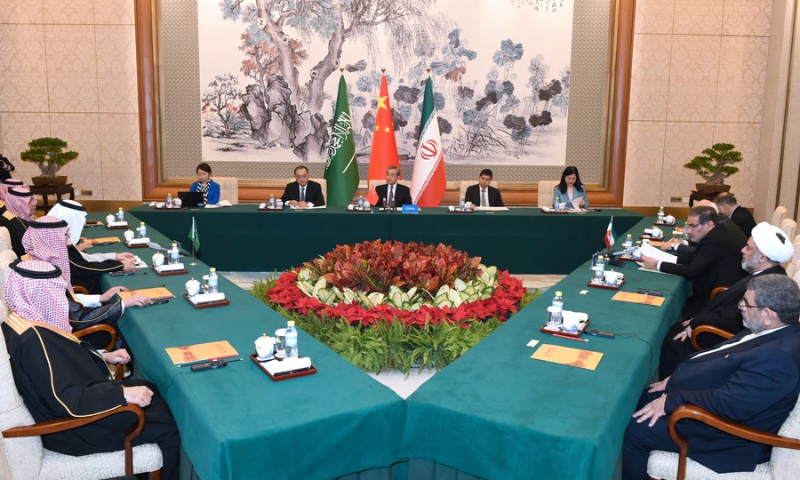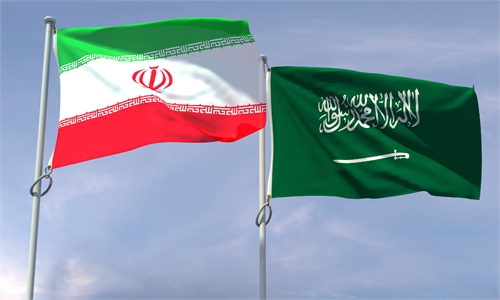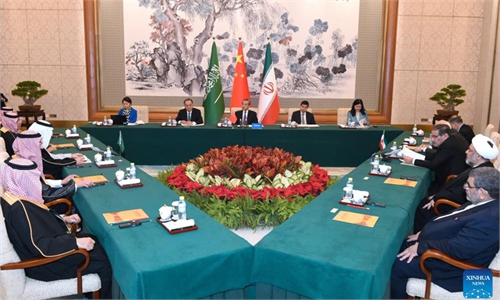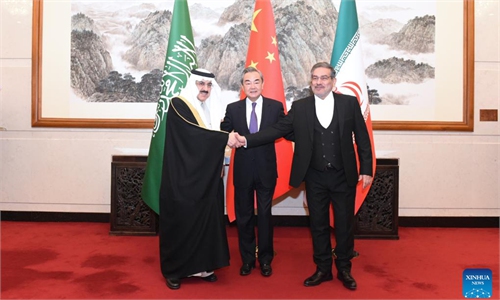China’s experience in resuming Tehran-Riyadh ties helps mediation for other conflicts worldwide

Wang Yi, a member of the Political Bureau of the Communist Party of China (CPC) Central Committee and director of the Office of the Foreign Affairs Commission of the CPC Central Committee, presides over the closing meeting of the talks between a Saudi delegation and an Iranian delegation in Beijing, capital of China, March 10, 2023. (Xinhua/Luo Xiaoguang)
China's effort to help the reestablishment of diplomatic ties between Saudi Arabia and Iran has been praised by the UN and the vast majority of the international community, and it was especially welcomed by Middle East and Islamic countries that will be directly affected by the development of the situation, with experts saying that the experience China gained from this case is helpful for its mediation in conflicts and tensions worldwide, including the ongoing Ukraine crisis.
Chinese Foreign Ministry spokesperson Wang Wenbin said the Saudi-Iran dialogue in Beijing was a successful practice of implementing the Global Security Initiative proposed by China. The facts prove that "divide and rule" and "bloc-to-bloc confrontation" are never the correct ways to handle security issues, he said.
After the China-Saudi Arabia-Iran trilateral statement was announced on Friday, countries including Egypt, Turkey, Pakistan, Iraq, Algeria, Oman, Kuwait, Lebanon, Jordan and the United Arab Emirates expressed their welcome and said it was a great victory for easing tensions in the region.
Leaders of some international organizations including the UN, the Arab League and the Organization of Islamic Cooperation expressed their welcome for the move and praised the diplomatic activity.
But Washington is reluctant to praise China's effort although it also expressed a welcoming attitude, and US officials and media have tried to misinterpret China's motivation on the issue.
Experts said this proves that the US is not sincere in wanting to see easing tension in the Middle East, as its hegemonic influence always relies on the chaotic situation or tensions among countries not only in the Middle East, but also in Europe and the Asia-Pacific region.
US-led military alliances like NATO and AUKUS live by the "bloc-to-bloc confrontation" stance, so Washington prefers to provoke and instigate conflicts between countries in relevant regions and encourage them to fight against each other, rather than mediation and peace building, said analysts.
Li Haidong, a professor at the Institute of International Relations at the China Foreign Affairs University, told the Global Times on Tuesday that with increasing turbulence around the globe in recent years, more and more countries have realized that US' participation or intervention in regional issues with the pretexts of so-called universal values or collective security actually creates chaos, worsens existing tensions and interrupts the peace process.
"Therefore, many countries hope a new idea can really ensure their security and that of the region, and desperately need a new solution that can effectively bring stability and prosperity to their regions. China has presented a successful and convincing example for international mediation at this key moment," and relevant countries have recognized that China is able to make significant and effective contributions to regional and world peace, Li said.
China's important role in restoring Tehran-Riyadh relations is part of Beijing's efforts to help ensure peace, stability and security in the Middle East, the Iranian Foreign Ministry said on Monday, the Xinhua News Agency reported.
By hosting the Iranian and Saudi Arabian delegations and exchanging messages between the two sides, China managed to prepare the ground, with goodwill, for holding a successful meeting for the achievement of the agreement between Iran and Saudi Arabia, the ministry's spokesperson Nasser Kanaani told a weekly press conference.
Iran always praises such roles, as ensuring peace, stability and security in the region contributes to safeguarding the collective interests of all countries that seek benefits in stability and security, Kanaani said, adding that the Chinese government's role serves the common good and all sides' interests.
Apart from the Middle East, many countries in the international community, including some Western countries, are holding high expectations on China to mediate some ongoing crises, especially the Russia-Ukraine conflict, which is bringing huge damage to the region and the world, experts said.
Cui Heng, an assistant research fellow at the Center for Russian Studies of East China Normal University, told the Global Times on Tuesday that "mediation of the Russia-Ukraine conflict should be easier than persuading Saudi Arabia and Iran to resume diplomatic ties, to some extent."
The problems between Tehran and Riyadh are very complicated, involving sectarian and geopolitical conflicts. Russia and Ukraine don't have sectarian conflicts, and the nature of the Russia-Ukraine conflict is the geopolitical confrontation between the expansion of the US-led Western bloc and Russia's demand for security and power balance in the continent, and Kiev is the proxy supported by the West to confront Moscow on the battlefields, Cui said.
As long as Ukraine can make decisions independently and pragmatically based on its own interests, or the US can engage with Russia for dialogue rather than adding fuel to the fire, Russia is open for negotiations, so the relevant countries do have a reason to hold confidence in China's mediation effort in the crisis, experts said.
But China will do it in China's way based on the spirit of the Global Security Initiative, and China will remain neutral and fair rather than simply helping one side pressure the other, they noted.




